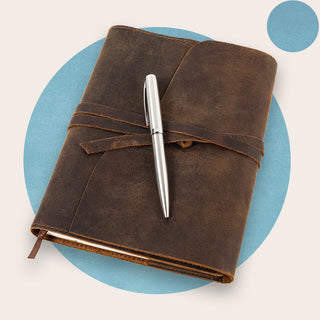Are you lathering yourself each day anew with stress upon stress and simply do not know how to deal with it? Want to learn how to journal for anxiety and other anxious thoughts?
Well, you are in the right place, for today we will be exploring precisely this, going through anxiety journaling in greater detail, its benefits, and how you can go about starting your own journaling practice.

Does it Work?
There have been several studies that do indeed journaling benefits mental health considerably. Try these journal prompts specifically designed to help with anxiety.
Prevents and Calms Anxiety
Learning how to journal for anxiety can be of great benefit to tackling these feelings of anxiety. By chronicling these feelings in a tangible form via journal prompts, these negative thoughts can then be made sense of.
The idea of anxiety journaling is to relieve stress by making something that appears ephemeral and insurmountable into something that can be tackled and reasoned with.
Thus, starting a thought diary for your anxious thoughts can be a great way to manage anxiety.
Mental Distress
Online positive affect journaling in this way has also been shown to reduce mental distress.
Yes, even if your feelings of anguish are not directly related to anxiety, you can use expressive writing to better combat anxiety and other related negative thoughts. Journaling for mental health is more common than you think.
If, for example, you were experiencing some understandable trauma and distress as a result of a cancer diagnosis, you could use journaling to better face these issues head-on. In this way, a regular journaling practice can replace the need for a therapist. You can be your very own therapist.
Well-being
There has been much research invested in exploring the relationship between humans and journaling, much of which has come out in support of the idea that journaling is of benefit to one's well-being.
If you are feeling elevated anxiety symptoms, then you can just as well engage with some journaling prompts to help.
There has been other research into the idea that journaling can provide each user with greater happiness overall, even in areas that are unrelated to the things you are chronicling in your journal.
Indeed, journaling can help to impregnate life with new energy, one that makes life worth living again.
Depression
In much the same way, there have been plenty of studies into the relationship between journaling and the combatting of depression. Much has been made of it and the common consensus is that journaling is indeed a valuable exercise for those experiencing depression.
It can benefit those afflicted by allowing them to better process what precisely it is that is leading them to feel this way. In the midst of depression, it can all feel like a great dense fog. Journaling can allow you to penetrate through this thick fog to investigate what exactly has brought it on in the first place.

Stress Management
Those who feel anxious often relate these anxious feelings to a negative thoughts spiral brought about by stress. These feelings are closely interrelated. Stress is the response of the body and mind to a perceived threat, while anxiety is the body's subsequent reaction to this stress.
If the point of stress is not addressed, then those afflicted will continue feeling anxious, something that can cause some grave health concerns in the long term.
Journaling has been known to allow a person feeling stressed about something to process it properly so that they may properly address what can otherwise be a panicked set of thoughts and feelings.
Some Tips
So, now you have seen some of the benefits of anxiety journaling, how about some tips to get you started?
Habit
If you are looking to identify patterns of anxious behavior on your part, then you are going to want to start a new pattern of your own. This means making a habit of anxiety writing as often as possible, though preferably doing so each day.
Habit forming in this way will also help the body and mind to adopt these same habits, allowing your work dealing with thinking patterns to translate into the real world.
Access
Besides making a habit of it, one of the most important things when regularly engaging with this kind of research into the self is to have your tools handy at any given time.
Sure, you will want to force yourself to write at a given time each day even if you are not necessarily feeling inspired, but sometimes the inspiration can strike when you are least expecting it.
Just as you would keep a dream journal by your bed in case you wake in the middle of the night and need to write something down, you should keep your writing implements handy for anxiety journaling.
Honor Thyself
There is no correct way to engage with journaling your own emotions other than to ensure that you are being as true to yourself as possible.
This could translate to, say, the way that you chronicle your journal. You might, for example, be more technologically inclined, in which case it would not make much sense for you to go out and buy a paper journal. You could just as easily use an electronic notepad or even talk aloud about those feelings.
Write Everything
Something that you are often taught when you begin to learn creative writing from a tutor is the art of automatic writing. This is a type of writing where you write without stopping on a given topic, allowing your mind and your pen to fuse and operate as one. To the uninitiated, this can be incredibly difficult, but it can be a vital way to scrape at the bottom of the brain where the conscious mind scarcely looks.
Such an exercise can also be used in anxiety journaling, allowing the subconscious (where all those raw feelings and thoughts are embedded) to have free reign over the pen and paper.
Thought Patterns
One of the most valuable things you can do when tackling anxious tendencies is to track your thought patterns. Now, this is obviously easier said than done considering we are in our minds all of the time. But this is the kind of thing that someone with whom you are having CBT (Cognitive Behavioral Therapy) will encourage you to engage in.
You can, of course, do all of this on your own, and research suggests that the results will be even more effective in the long term if you do it at your own behest.
Final Words
So, there you have it! Hopefully, you are feeling a little more able to navigate those anxious thoughts now that you have started your own anxiety journal. If not, seek help and therapy.
FAQs How to Journal for Anxiety
WHAT KIND OF JOURNALING HELPS ANXIETY?
According to research, most journaling is good for easing anxious tendencies. Any kind of journaling that attempts to directly engage with these thoughts and feelings will do the trick, though sometimes it is better to inadvertently face a problem. In the latter case, the conscious mind is less able to talk its way out of actually dealing with a problem, less able to turn itself away through lies and subterfuge.
DOES A WRITING JOURNAL HELP ANXIETY?
Indeed it does. There has been plenty of research on this topic and much of it has come forth to suggest that journaling does help keep anxious thoughts at bay. This goes for just about any kind of journaling. One of the more common types these days is bullet journaling, a kind that attempts to help someone achieve a better work-life balance. Even such a journal as this will enable the user to feel less anxious about their life, even if it is only regarding this one thing.



